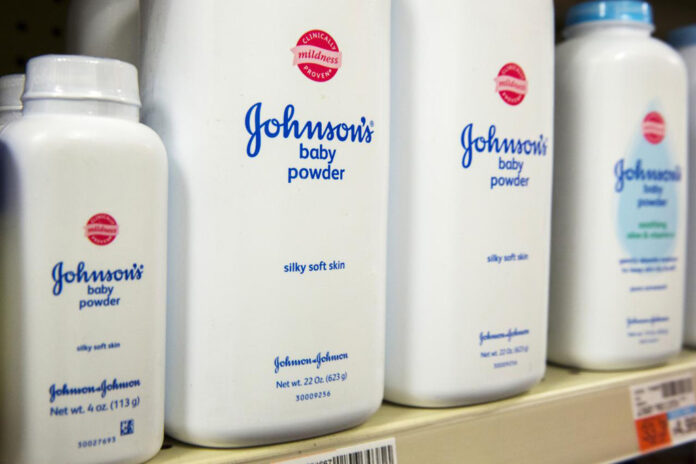Johnson & Johnson on Tuesday announced it would stop selling its talc Baby Powder in the United States and Canada, saying demand had dropped in the wake of what it called “misinformation” about the product’s safety amid a barrage of legal challenges.
J&J faces more than 19,000 lawsuits from consumers and their survivors claiming its talc products caused cancer due to contamination with asbestos, a known carcinogen. Many are pending before a US district judge in New Jersey. “I wish my mother could be here to see this day,” said Crystal Deckard, whose mother Darlene Coker alleged Baby Powder caused her mesothelioma. She dropped the suit filed in 1999 after losing her fight to compel J&J to divulge internal records. Coker died of mesothelioma in 2009.
In its statement, J&J said it “remains steadfastly confident in the safety of talc-based Johnson’s Baby Powder,” citing “decades of scientific studies.” J&J has faced intense scrutiny of the safety of its baby powder following an investigative report by a foreign news agency in 2018 that found the company knew for decades that asbestos lurked in its talc.
Internal company records, trial testimony and other evidence show that from at least 1971 to the early 2000s, the company’s raw talc and finished powders sometimes tested positive for small amounts of asbestos.
The article prompted a stock selloff that erased about $40 billion from J&J’s market value in one day and created a public relations crisis as the blue-chip healthcare conglomerate faced widespread questions about the possible health effects of one of its most iconic products.
J&J has also been the target of a federal criminal investigation into how forthright it has been about its talc products’ safety, an investigation by 41 states into its baby powder sales, which it disclosed in April, and an investigation into health risks of asbestos in talc-containing consumer products by a Congressional subcommittee.
US Representative Raja Krishnamoorthi, who led the Congressional inquiry, described J&J’s decision to stop selling talc baby powder as “a major victory for public health”, adding: “My Subcommittee’s 14-month investigation revealed that Johnson & Johnson knew for decades that its product contains asbestos.”
In response to evidence of asbestos contamination presented in media reports, in the court room and on Capitol Hill, J&J has repeatedly said its talc products are safe, and do not cause cancer. Apart from the baby powder controversy, the company revered by millions of consumers and one of the most trusted brands in America, more recently has faced a series of legal and reputational challenges. J&J has said it has been named as a defendant, along with other drugmakers, in more than 2,900 lawsuits alleging the companies improperly promoted addictive opioids.
In August, an Oklahoma judge rendered the first verdict in that litigation, ordering J&J to pay $572.1 million to the state for its part in fuelling an opioid epidemic by deceptively marketing addictive painkillers. J&J is appealing the Oklahoma judge’s ruling and has denied it caused the opioid crisis. Johnson & Johnson on Tuesday said it had stopped shipping talc baby powder when the Covid-19 crisis led to limits on shopping and manufacturing, and that now it would wind down North American sales.
“Demand for talc-based Johnson’s Baby Powder in North America has been declining due in large part to changes in consumer habits and fuelled by misinformation around the safety of the product and a constant barrage of litigation advertising,” it said in a statement. Sold continuously since 1894, Johnson’s Baby Powder now accounts for only about 0.5pc of its US consumer health business, the company said. But it remains a symbol of the company’s family-friendly image. An internal J&J marketing presentation from 1999 refers to the baby products division, with Baby Powder at the core, as J&J’s “#1 Asset,” grounded in “deep, personal trust” and a 2003 internal memo described it as a “sacred cow,” Reuters reported.
Christie Nordhielm, a professor of marketing at Georgetown, said it appears J&J made its decision to withdraw from the market while consumers are preoccupied with the pandemic. “It’s a nice time to quietly do it,” she said, adding “it will minimise the reputational hit.”
Shares of J&J were unchanged in after-hours trading following the disclosure. “We will continue to vigorously defend the product, its safety, and the unfounded allegations against it and the Company in the courtroom,” Johnson & Johnson said. “All verdicts against the company that have been through the appeals process have been overturned.”
Krystal Kim, one of 22 women with ovarian cancer whose case in St. Louis resulted in a 2018 jury verdict of $4.69 billion against J&J, said the decision was “a step in the right direction.” J&J has appealed that verdict.
Nevertheless, J&J’s legal challenges likely will continue, some lawyers said. In April, a New Jersey judge ruled that thousands of plaintiffs who allege J&J’s talc products caused cancer can go forward with their claims, but face limits on what expert testimony would be allowed in trials.
“Just taking it off the shelf today doesn’t end the litigation by a long shot,” said Loyola Law Professor Adam Zimmerman. Asbestos is known to cause cancer that emerges decades after exposure. Cases involving asbestos-containing products removed from the marketplace long ago “continue to be litigated very actively to this day,” Zimmerman said.
Many of the lawsuits allege Baby Powder caused plaintiffs’ mesothelioma, an incurable cancer of the lining of the lungs and other organs commonly caused by asbestos. “Just as J&J vows to continue fighting vigorously in the courts, we look forward to meeting them there as we continue to pursue justice for our clients,” said Chris Placitella, one of the lead lawyers representing plaintiffs in the cases consolidated in a New Jersey federal court. J&J said it will continue to sell cornstarch-based baby powder in North America, and will sell both its talc and cornstarch-based products in other markets around the world.




